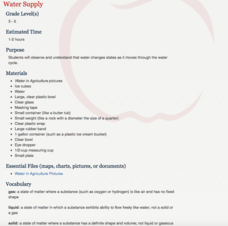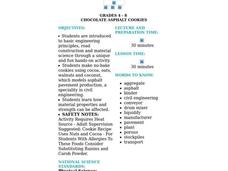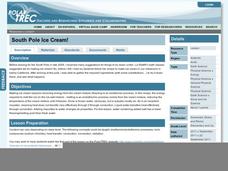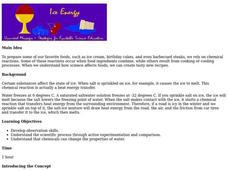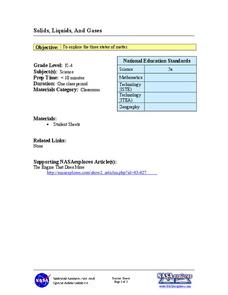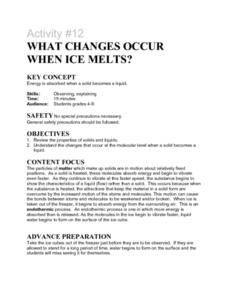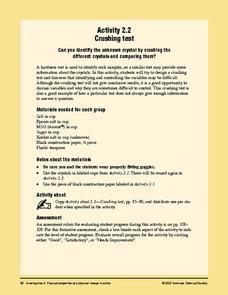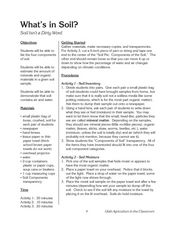Curated OER
Ice Cream
Open this instructional activity by giving a brief history of ice cream. Using liquid nitrogen to lower the temperature, preteens make their own confection. The accompanying activity sheet queries learners about freezing point, the...
National Institute of Food and Agriculture
Water Supply
Participate in three activities that look at the earth's limited water supply and the changes water goes through as it enters each phase of the water cycle. The resource is complete with three activities that demonstrate the changing...
Curated OER
How Does a Liquid Become a Solid?
Students explore the energy changes from a liquid to a solid. They model the arrangement of a solid and the change in states due to changes in energy using desks and chairs. Assessment questions are provided in lesson plan.
Curated OER
Chocolate Asphalt Cookies
Learners make no-bake cookies to learn basic engineering principles, road construction and material science. They experience properties and changes in matter.
Curated OER
Hot Stuff
Students investigate if heat can change the form of matter. In this physics lesson plan, students use heat sources to observe the changes in an ice cube. Students graph which heat source changed the matter the fastest.
Curated OER
Ice Cream Blizzards
Fourth graders explore whether the making of homemade ice cream is a physical change or a chemical change in a lab experiment. Students identify states of matter, describe the physical properties of states, and collect temperature data...
Polar Trec
South Pole Ice Cream!
How can you turn an ice cream activity into a scientific investigation? It's easy if you know ionic compounds, heat transfer, and the exothermic and endothermic process. Learners will explore the science behind freezing, insulation, and...
Curated OER
Ice Energy
Students investigate how salt affects the state of ice. In this ice cream making lesson plan, students change the freezing temperature by adding salt and observing the results. Students use experimentation and comparison to see how...
American Chemical Society
Using the Combining Test to Identify Unknown Liquids
Once investigators have learned how their mystery liquids interact with water during the preceding activity, they now use their observations to identify them. This is an ideal conclusion to the mini unit on the properties of water.
Cornell University
Polymers: Instant Snow
Is it easy to make snow? Scholars use critical thinking skills as they investigate the concept of polymers by making snow. The class tests several different variables and takes measurements over the course of several days. They then...
American Chemical Society
Using Color to See How Liquids Combine
Blue-tinted water is added to unknown liquids that have been tinted yellow to find out how they interact. This is a memorable activity that is part of an investigation on the properties of liquids, which is part of a unit on the...
Curated OER
Investigating Chemical and Physical Changes
Students explore physical and chemical changes by looking at how different powders react to a variety of substances. They observe and identify the difference between physical and chemical change using a mystery powder.
Curated OER
The Water Cycle
Fourth graders explore changes in water forms. In this water cycle lesson, 4th graders build a water cycle model and monitor it for 2 weeks in order to understand that water changes state as it moves through the cycle.
Curated OER
Making Changes
Learners observe and record the changes they see when adding heat and cold to objects. In this changes lesson plan, students experiment with different objects and see if heat and cold change the makeup of the object. They then record...
Curated OER
States of Matter
Fourth graders define the term matter. They compare properties of solids, liquids, and gases. They describe how matter changes from one state to another. They classify objects as either solid, liquid, or gas.
Curated OER
Solids, Liquids, and Gases
Students investigate and explore the three states of matter. They read and discuss the NASA article "The Engine That Does More," identify examples of each state of matter, and as a class complete a section of two worksheets. They...
Curated OER
Earth's Ecology
Students investigate the three states of water. In this physical science instructional activity, students watch the video "Earth's Ecology" and observe water in its' three states. Students record observations.
Curated OER
Matter
Young scholars complete a unit of activities to learn about states of matter and how to measure matter. In this matter lesson, students complete 8 lessons to learn about matter, its states, and how to measure matter.
Curated OER
Activity #6 'Nothing' Matters: A Demonstration
Students observe the 'pouring' of a gas. They compare the masses (weights) and densities of two gases. Pupils define the following terms: matter, mass, and density. Students answer questions after watching the demonstration.
Curated OER
What Changes Occur When Ice Melts?
Learners explore the physical process of melting. They observe melting ice and answer questions related to energy transfer during phase changes.
PBS
Breaking it Down
After challenging themselves to correctly choose the form of erosion and length of time required for a given landform to develop, earth science class members model mechanical and chemical weathering with various lab demonstrations over...
American Chemical Society
Crushing Test
Solidify understanding of the properties of crystals by crushing them to compare hardness. After some class discussion, a procedure is planned, and then small groups go about making observations as they crush five different crystal...
Curated OER
Compost in a Bag!
Fourth graders experiment to see which objects decompose. In this compost lesson, 4th graders observe the changes of labeled objects in a bag. Leave the objects for one month and record the changes by observation and weight. Students...
Curated OER
What's in Soil?
Students examine soil samples and make observations. In this soil lesson, students participate in experiments to determine the components (mineral matter, organic matter, water air) in the soil. Students analyze a pie graph on the...
Other popular searches
- Chemical Changes in Matter
- Physical Changes in Matter
- Phase Changes in Matter
- Changes in Matter Activities
- Changes in Matter Water
- Changes in Matter Chemistry
- Matter Changes in State
- Changes in Matter/ Shadows
- Changes in Matter Presentation
- Changes in Matter Properities



